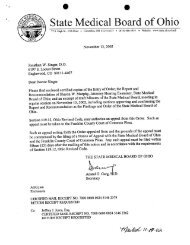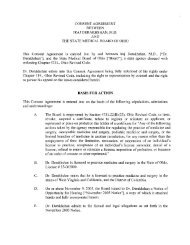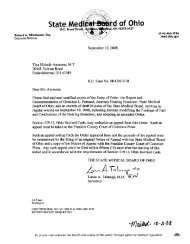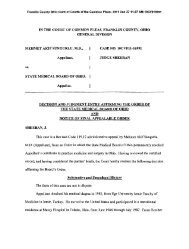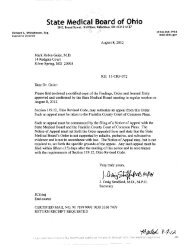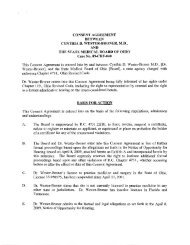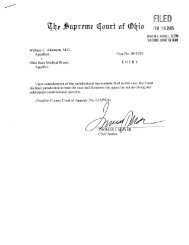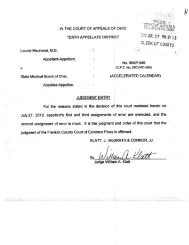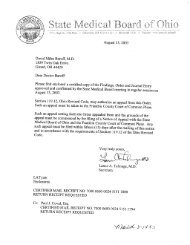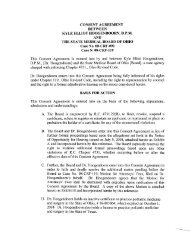Untitled - State Medical Board of Ohio - State of Ohio
Untitled - State Medical Board of Ohio - State of Ohio
Untitled - State Medical Board of Ohio - State of Ohio
Create successful ePaper yourself
Turn your PDF publications into a flip-book with our unique Google optimized e-Paper software.
Report and Recommendation<br />
In the Matter <strong>of</strong> Jeffrey Vaughn Meyer, M.D.<br />
Page 4<br />
tested positive for marijuana. (<strong>State</strong>’s Exhibit [St. Ex.] 2 at 21) As a result, Dr. Meyer was<br />
precluded from the fellowship. (Tr. at 185-186, 201)<br />
3. On or about August 15, 2005, Dr. Meyer entered Shepherd Hill, a <strong>Board</strong>-approved<br />
treatment provider in Newark, <strong>Ohio</strong>, to undergo a three-day inpatient evaluation to<br />
determine if he was impaired. The urine sample that Dr. Meyer provided upon entering<br />
Shepherd Hill tested positive for marijuana. Dr. Meyer testified that he did not use<br />
marijuana between July 7 and August 15, 2005, and yet he was “still testing positive” for<br />
marijuana. (Tr. at 187-188) Shepherd Hill diagnosed Dr. Meyer with cannabis abuse and<br />
concluded that he was impaired in his ability to practice according to acceptable and<br />
prevailing standards <strong>of</strong> care. (St. Ex. 2 at 21; Tr. at 187, 201)<br />
4. In light <strong>of</strong> that diagnosis and in lieu <strong>of</strong> formal proceedings, Dr. Meyer entered into a Step I<br />
Consent Agreement on October 12, 2005, with the <strong>Board</strong> [Step I agreement]. The Step I<br />
agreement reflects that the <strong>Board</strong> entered into the Step I agreement based upon Dr. Meyer’s<br />
violations <strong>of</strong> Sections 4731.22(B)(5) and (B)(26), <strong>Ohio</strong> Revised Code. In the Step I<br />
agreement, Dr. Meyer admitted that he had used marijuana every other weekend between<br />
January and May 2005. Pursuant to the Step I agreement, Dr. Meyer’s training certificate<br />
was indefinitely suspended for at least 90 days, and Dr. Meyer was required, among other<br />
things, to maintain sobriety, submit to random urine screens, and participate in a<br />
rehabilitation program. The agreement also included a list <strong>of</strong> terms, conditions, and<br />
limitations that had to be fulfilled in order for the <strong>Board</strong> to consider reinstatement or<br />
renewal <strong>of</strong> Dr. Meyer’s training certificate, or issuance <strong>of</strong> any other certificate to<br />
Dr. Meyer. (St. Ex. 2 at 20-27)<br />
5. On or about October 11, 2005, Dr. Meyer entered the Woods at Parkside [Parkside], a<br />
<strong>Board</strong>-approved treatment provider in Columbus, <strong>Ohio</strong>, to undergo inpatient treatment.<br />
Dr. Meyer testified that he had last used marijuana on October 1, 2005, and a drug test<br />
taken while at Parkside later that month was positive for marijuana. (Tr. at 187, 202)<br />
Dr. Meyer successfully completed that 28-day treatment and was discharged in November<br />
2005. He thereafter participated in an aftercare contract with Parkside and in an advocacy<br />
contract with the <strong>Ohio</strong> Physicians Health Program Inc. [OPHP] Later, two physicians<br />
reported that Dr. Meyer was capable <strong>of</strong> practicing medicine and surgery according to<br />
acceptable and prevailing standards <strong>of</strong> care, so long as certain treatment and monitoring<br />
requirements are in place. (St. Ex. 2 at 11-12; Tr. at 188-189)<br />
6. Dr. Meyer’s <strong>Ohio</strong> training certificate was suspended on October 12, 2005. He did not seek<br />
to reinstate or renew that training certificate, and it expired on June 30, 2006. (St. Ex. 2 at<br />
10-11)



